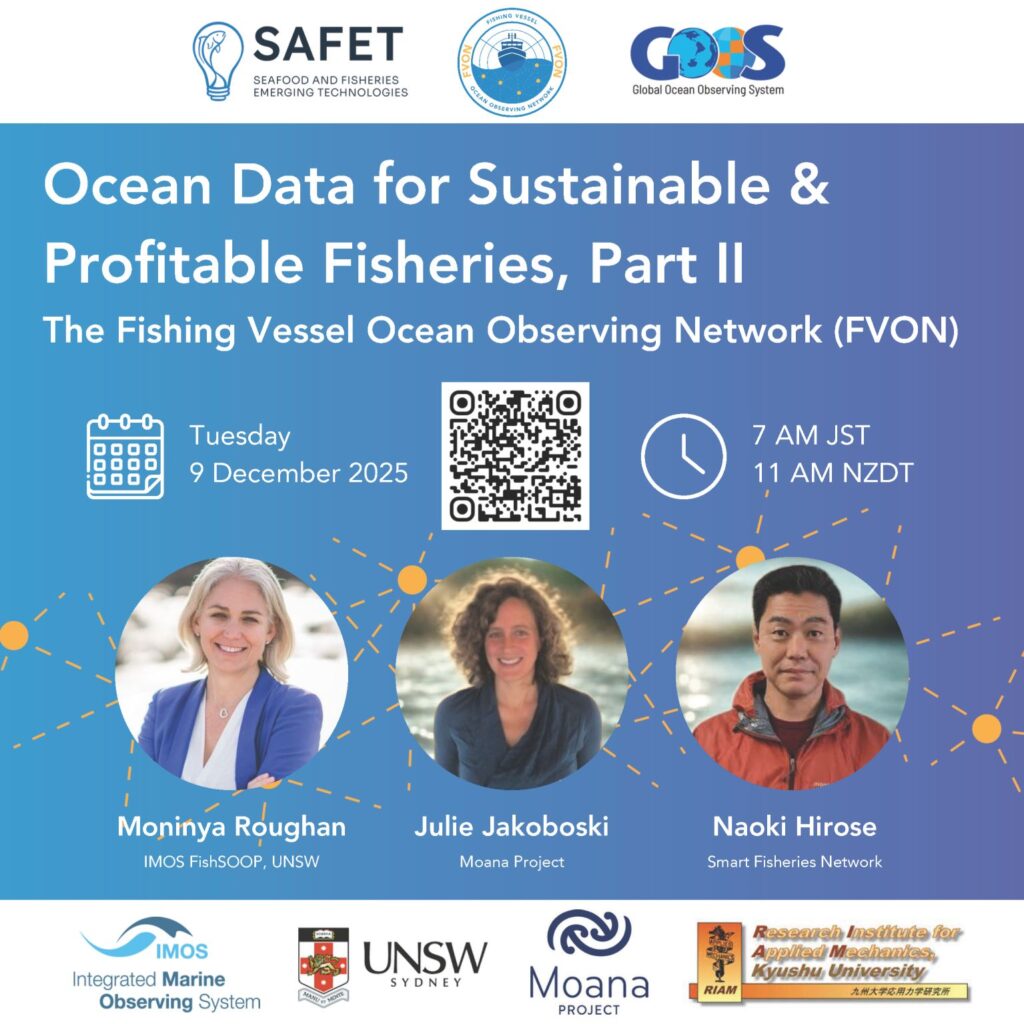We are excited to announce an upcoming webinar featuring one of the four GOOS emerging networks – the Fishing Vessel Ocean Observing Network (FVON) – and co-hosted by Seafood and Fisheries Emerging Technologies (SAFET) and the Global Ocean Observing System (GOOS):
Ocean Data for Sustainable & Profitable Fisheries: the Fishing Vessel Ocean Observing Network (FVON)
Date: 9 December 2025 | 09:00 AEDT / 17:00 EST | 90 minutes | Recording will be shared
Format: Presentations | Q&A session
Register here: https://zoom.us/webinar/register/WN_SnowggyFSNigppYkZMV6sA#/registration

This is Part II of a two-part series that includes real-world examples that demonstrate how integrating cost-effective sensors into existing fishing operations is already producing measurable benefits for fishing communities.
Part II focuses on the Eastern Hemisphere and will feature:
- FishSOOP, PI-FVON (Australia and the Pacific Islands): Dr. Moninya Roughan will demonstrate how ocean data is helping fishers anticipate the movement of key commercial species, highlighting new deployments in Australia, Papua New Guinea, Fiji, the Solomon Islands, Samoa, and French Polynesia.
- AMOS, formerly Moana Project (New Zealand): Dr. Julie Jakoboski will discuss how real-time ocean data from vessels is improving predictions of marine heatwaves around New Zealand.
- SFiN (Japan): Dr. Naoki Hirose will describe how integrated data systems are improving the economic efficiency of Japanese fisheries.
The event will conclude with a moderated panel Q&A focused on how these approaches can scale globally and support inclusive, science-based fisheries governance.
See information about Part I of the webinar series (including the webinar recording) below.
Ocean Data for Sustainable & Profitable Fisheries: the Fishing Vessel Ocean Observing Network (FVON) – Part I
Date: 9 October 2025 | 16:00 UTC / 12:00 EDT
Format: Presentations | Q&A session
Register here: The first webinar has now ended. Watch the webinar recording below:
This is Part I of a two-part series. This series includes real-world examples that demonstrate how integrating cost-effective sensors into existing fishing operations is already producing measurable benefits for fishing communities.
Part I focuses on the Western Hemisphere and feature:
- eMOLT (USA): Dr. George Maynard will present how lobster traps and trawlers equipped with sensors inform sustainable fisheries stock assessments and protect fishers at sea.
- ODN (USA, Mexico, The Bahamas, Ghana, and more): Cooper Van Vranken will share how fishers use digital tools to improve fishing operations.
The event will conclude with a moderated panel Q&A focused on how these approaches can scale globally and support inclusive, science-based fisheries governance.
More information on Part II of the webinar will be shared soon. Keep an eye out if you are interested in learning more about fishing vessel-based ocean observing in New Zealand, Japan, and other parts of the Eastern Hemisphere, and more ways fishers are using ocean data to save on time, fuel, and money while fishing more sustainably.
